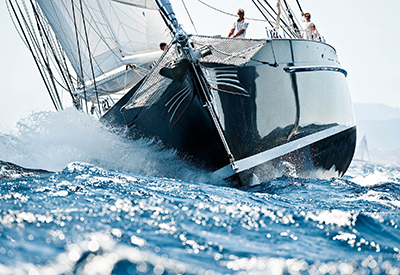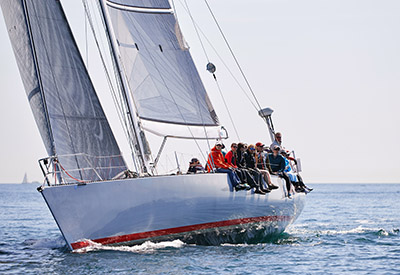Blue gym effect: Boating improves health and wellbeing

Sept 13, 2022
Professor Charles Spence, from Oxford University’s Crossmodal Research Laboratory, has researched the benefits of how something he calls the ‘blue gym effect’ can lead to improving health and wellbeing, anxiety reduction, and better sleep patterns.
With boat sales on the rise over the last few years and recreational boating an increasingly popular activity, those lucky enough to get out on boats are the biggest beneficiaries.
The emotional and physical benefits of being out in nature have been long documented, but a new academic study claims that the shimmering sights and sounds of a body of water are far better for us than any green space.
With the average person spending 90 per cent of their life indoors, the need to fuel up on the social, cognitive, emotional, and physical health benefits of the great outdoors has never been greater. Combating work burnout and SAD (seasonal affective disorder), both of which can cause anxiety, depression and sleep disorders, is increasingly important.
In our post-pandemic, hybrid work-from-home lifestyles, going for a walk or run in the countryside, a hike or even a stroll in your local park are simple ways to get outdoors. However, Professor Charles Spence, from Oxford University’s Crossmodal Research Laboratory, believes there is an even greater prize out there. Professor Charles Spence
Professor Charles Spence
The professor, commissioned by coatings manufacturer AkzoNobel, collated his findings from 20 separate research papers on health and wellbeing, covering stress reduction, anxiety reduction, aggression reduction, ADHD symptom reduction, blood pressure reduction, reduced obesity, asthma and allergy reduction, better sleep, better mental health, increased prosocial behaviours and social connectedness, improved post-operative recovery, improved birth outcomes, improved child development, improved heart health, improved pain control, better eyesight and improved mortality *.
Further, Professor Spence assessed peer written studies on the overall health benefits of living near green space all over the world, the benefits of exercise that involve water and the effects of using less technology while on the water **.
The results, as adjudged by Professor Spence, are definitive. Swapping green space for blue space means people can super-charge their senses and get the ultimate wellbeing workout – something he calls the ‘blue gym effect’.
Professor Spence, in his new paper entitled Multisensory Well-being and Boating (which will be published in peer review journals) states: “So-called blue space has even greater health and well-being benefits than green space.
“While the effect is often considered in terms of vision – perhaps unsurprising given that we are so visually dominant – there is a growing awareness of just how important the sounds of water and wildlife are to the beneficial effects of nature.
“The results of research conducted in national parks across North America revealed that the sounds of water had the biggest positive effect on health and positive affect outcomes.
“Water sounds have also been shown to provide an effective foil to the stress-inducing anthropogenic noise of urban, typically transport, activities.”
Away from the sound of water itself, associated sounds of the coast and boating also have strong positive connections. The sound of a spinnaker rattling in the breeze, the wind in the sails and the buzz of a powerboat motor starting up are all referenced by Professor Spence.
He says: “Some have even gone so far as to suggest that the rhythmical sounds of waves crashing on the beach remind us of the sound we heard first in life when we were in the womb.
“Layered with the sight and sounds, the impact of the smells of nature *** and being close to water on our mental and physical well-being is tangible. Here, in particular, there appears to be benefits of ocean air (ozone) from being close to sea, with negative ions being given off by large bodies of water (e.g., at the beach).”
“Ocean air and its ions are probably what is more beneficial for us physiologically than the tangy smell of the sea. The latter is caused by the release of dimethyl-sulphide (DMS) from the breakdown of bacteria, and as we have just seen may be linked to psychological benefits due to its association with happy, healthy memories.
“Being by the beach has restorative and sleep-enhancing functions, as was well understood by some Victorian doctors who would often send their patients off to the coast to recuperate. The human immune system likely also benefits from increased exposure to biodiversity, to microorganisms in bacteria, protozoa and helminths, when out in nature.
“One of the simplest, not to mention most effective, ways to reduce the nearly 12 million working days that are lost every year in the UK due to stress, depression or anxiety is to get out into nature ****, better still if we can get out onto the water.”
The difference between passively going to the sea or to a lake, versus being out on the water, was another area explored by Spence as he sought to understand the best well-being workout.
With boat sales on the rise over the last few years and recreational boating an increasingly popular activity, those lucky enough to get out on boats are the biggest beneficiaries.
Professor Spence says: “The difference between being literally on the water rather than simply being close to it links to increasingly popular notions of ‘embodied cognition’: the basic idea that we think with, and through, our bodies and not just with our brains.
 “Being on the water promotes bodily awareness, given that we presumably need to pay attention to maintain our balance. It encourages a kind of mindful presence in the activity involved. There is also a very real pleasure associated with our attention being drawn to the bodily senses, such as touch and proprioception. Navigating on the water requires more attention to one’s surroundings than simply walking, an activity we can do on autopilot.”
“Being on the water promotes bodily awareness, given that we presumably need to pay attention to maintain our balance. It encourages a kind of mindful presence in the activity involved. There is also a very real pleasure associated with our attention being drawn to the bodily senses, such as touch and proprioception. Navigating on the water requires more attention to one’s surroundings than simply walking, an activity we can do on autopilot.”
AkzoNobel’s yacht coatings division, which commissioned the study, seeks to empower and support boat owners to tap into That Feeling – of joy, adrenaline or calm – by getting out on the water to enjoy their boat.
Matt Anzardo, Global Yacht Segment Manager at AkzoNobel Yacht Coatings, says: “We all know ‘that feeling’ – the one that sums up the exhilaration and satisfaction you get from spending time on the water. The AkzoNobel team share that love for boating; it’s the foundation of our research, technologies and innovations.
“As well as those sights, sounds and smells that all promote health, we know boat owners want their vessels looking and performing at their best. That’s where we come in, with market-leading, innovative, sustainable and beautifully aesthetic products for all kinds of vessels.”
Discover more about AkzoNobel’s yacht coatings and the citations for the work at https://www.yachtcoatings.com/en/gb/blue-gym



























